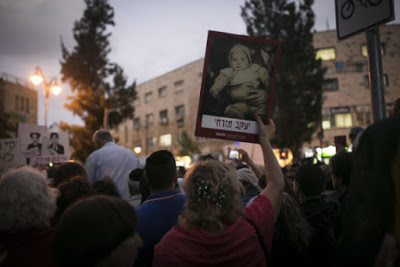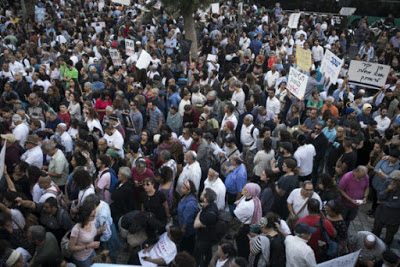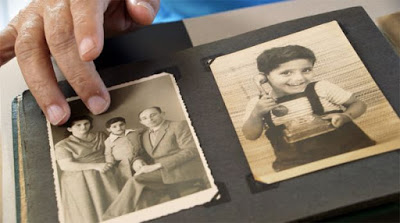Labour Zionism’s Kidnapping and Abduction of Thousands of Yemenite Babies
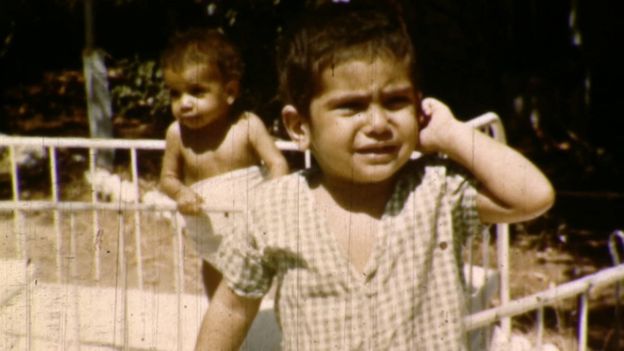 |
| Children were routinely separated from their parents on kibbutzes Spielberg Jewish Film Archive |
Less than two weeks ago, two thousand Yemenite Jews
demonstrated in Jerusalem in protest at the latest saga of the thousands of missing
babies. When the Israeli state was
founded in 1948, it was primarily by White European Ashkenazi Jews. Their racism towards the native Palestinians
was carried over into their treatment and attitudes towards the Arab Jews who
came after 1948.
Led by the Labour Zionist movement which ruled Israel
from 1948 till 1977, Israel’s rulers sought to eradicate the backward ‘Orientalist’
culture and behaviour of the Arab Jews. Zionism
sought to bring over the Arab Jews as the new Israeli working class but they
wanted to eradicate their Arab heritage as part of the creation of the new Israeli
Jewish people.
from 1948 till 1977, Israel’s rulers sought to eradicate the backward ‘Orientalist’
culture and behaviour of the Arab Jews. Zionism
sought to bring over the Arab Jews as the new Israeli working class but they
wanted to eradicate their Arab heritage as part of the creation of the new Israeli
Jewish people.
In many Arab countries, like Morocco and Iraq, there
was a deliberate policy of destabilisation of the Jewish communities. There was a steady determination that those
communities had to be destroyed and transplanted to Israel. See The Zionist
Destruction of the Iraqi Jewish Community – When the Zionist
Underground Planted Bombs Outside Baghdad’s Jewish Cafés and Synagogues. The
Zionist movement was nothing if not ruthless.
It needed to replace the Palestinians, who had been expelled because
they were not Jewish, with working class Jews, even if it meant uprooting
ancient communities and destroying their way of life.
was a deliberate policy of destabilisation of the Jewish communities. There was a steady determination that those
communities had to be destroyed and transplanted to Israel. See The Zionist
Destruction of the Iraqi Jewish Community – When the Zionist
Underground Planted Bombs Outside Baghdad’s Jewish Cafés and Synagogues. The
Zionist movement was nothing if not ruthless.
It needed to replace the Palestinians, who had been expelled because
they were not Jewish, with working class Jews, even if it meant uprooting
ancient communities and destroying their way of life.
The racist attitudes which led to the destruction
of these communities also made itself felt once these communities reached Israel. In the case of the Yemenite Jews, who were
the first Arab Jews to be brought over, thousands of their babies and children
were simply kidnapped and abducted, whilst their parents were told they had
suddenly died.
of these communities also made itself felt once these communities reached Israel. In the case of the Yemenite Jews, who were
the first Arab Jews to be brought over, thousands of their babies and children
were simply kidnapped and abducted, whilst their parents were told they had
suddenly died.
Zionism had sought to create a racially pure Jewish state. They were fascinated by the ideas of eugenics
[see Nazi &
Zionist Eugenics] and selective
breeding. What better way to improve the
human material than to separate babies off from their ‘backward’ parents. A state based on racist barbarism towards the
indigenous population was scared lest the same ‘unhealthy traits’ reappear in
the Arab Jews.
[see Nazi &
Zionist Eugenics] and selective
breeding. What better way to improve the
human material than to separate babies off from their ‘backward’ parents. A state based on racist barbarism towards the
indigenous population was scared lest the same ‘unhealthy traits’ reappear in
the Arab Jews.
Tony Greenstein
The
surviving relatives of Yemenite Jewish children that families says were
abducted by staff at state-run medical facilities and illicitly sold into
adoption protest in Jerusalem. The demonstrators called for the Israeli
government to investigate the alleged systematic kidnappings known as the
Yemenite Children Affair, June 21, 2017.
surviving relatives of Yemenite Jewish children that families says were
abducted by staff at state-run medical facilities and illicitly sold into
adoption protest in Jerusalem. The demonstrators called for the Israeli
government to investigate the alleged systematic kidnappings known as the
Yemenite Children Affair, June 21, 2017.
(Photo: Shiraz Grinbaum and Yotam
Ronen / Activestills.org)
Ronen / Activestills.org)
Over 2,000 Israeli Yemenite Jews and supporting activists gathered in
Jerusalem last Wednesday to mark an annual day of awareness for what
families say was a state-sponsored program to abduct Yemenite Jewish
infants and other Israeli children born to parents who were recent immigrants
from Arab countries.
Jerusalem last Wednesday to mark an annual day of awareness for what
families say was a state-sponsored program to abduct Yemenite Jewish
infants and other Israeli children born to parents who were recent immigrants
from Arab countries.
Known as the Yemenite Children Affair, in the first decade
after the establishment of the state of Israel in 1948, there was
a systematic kidnapping of newborn Yemenite children, carried out by
Israeli hospitals and government institutions. Mothers, who often were in
Israel for a short time and did not speak Hebrew, would enter hospitals or
other state facilities to give birth. Once the child was born medical staff
told the parents the child died unexpectedly. Yet none of
the families were shown bodies or burial documents. Many of the
families did not practice any mourning ceremonies because they believed their
missing children were still alive.
after the establishment of the state of Israel in 1948, there was
a systematic kidnapping of newborn Yemenite children, carried out by
Israeli hospitals and government institutions. Mothers, who often were in
Israel for a short time and did not speak Hebrew, would enter hospitals or
other state facilities to give birth. Once the child was born medical staff
told the parents the child died unexpectedly. Yet none of
the families were shown bodies or burial documents. Many of the
families did not practice any mourning ceremonies because they believed their
missing children were still alive.
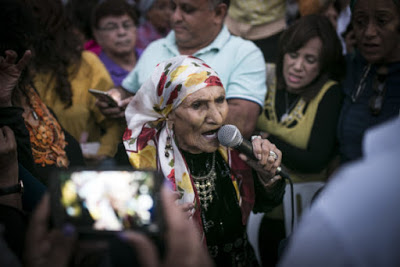 |
| (Photo: Shiraz Grinbaum and Yotam Ronen / Activestills.org |
The babies who went missing, parents claim, were given away to childless
Ashkenazi families (Jews of European descent–the dominant ethnic group in
Israel at the time), leaving the Yemenite families with no answers regarding
their children’s fate. In most cases, the families were told the children died
unexpectedly.
Ashkenazi families (Jews of European descent–the dominant ethnic group in
Israel at the time), leaving the Yemenite families with no answers regarding
their children’s fate. In most cases, the families were told the children died
unexpectedly.
There have been a few national state committees tasked with
investigating the matter over the decades, but they were previously accused of
ignoring real evidence and helping government efforts to cover up the affair.
Following recent pressure by the third generation of Jewish Yemenite activists,
part of the national archives and state protocols were disclosed to the public.
investigating the matter over the decades, but they were previously accused of
ignoring real evidence and helping government efforts to cover up the affair.
Following recent pressure by the third generation of Jewish Yemenite activists,
part of the national archives and state protocols were disclosed to the public.
Last year Benjamin Netanyahu had more than 3,500 government files on the
investigation into the disappearance of the children published online. A
Knesset committee followed up by confirming earlier this month that Yemenite
babies died during the 1950s after state medical institutions conducted
experiments on them. Despite the disclosures, the families are still
in the dark regarding their relatives, and the matter is still an open wound in
the Israeli society.
investigation into the disappearance of the children published online. A
Knesset committee followed up by confirming earlier this month that Yemenite
babies died during the 1950s after state medical institutions conducted
experiments on them. Despite the disclosures, the families are still
in the dark regarding their relatives, and the matter is still an open wound in
the Israeli society.
Seeking more answers, the Israeli
nonprofit Amram organized the protest in Jerusalem last week under the title
“Recognition, Justice, Healing,” calling on the government to open all of the
national archives, which could allow for family reunification. The
demonstrators also want the affair recognized as a crime against humanity.
nonprofit Amram organized the protest in Jerusalem last week under the title
“Recognition, Justice, Healing,” calling on the government to open all of the
national archives, which could allow for family reunification. The
demonstrators also want the affair recognized as a crime against humanity.
This was the largest protest on the topic in the history of Israel to
date.
date.
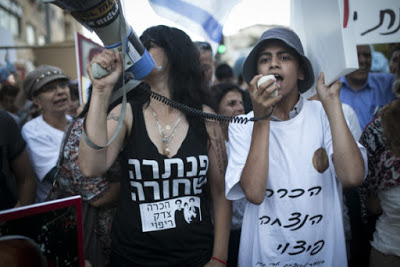 |
| (Photo: Shiraz Grinbaum and Yotam Ronen / Activestills.org |
Shiraz Grinbaum is an independent photographer and photo-editor, and a
member of the Activestills Photography Collective since 2012. She is the
co-editor of the book “Activestills: Photography as Protest in
Palestine/Israel” (Pluto Press, 2016). Yotam Ronen is an independent
photographer and a co-founder of the Activestills Photography Collective. He is
a staff member for Walla!, an Israeli news outlet.
member of the Activestills Photography Collective since 2012. She is the
co-editor of the book “Activestills: Photography as Protest in
Palestine/Israel” (Pluto Press, 2016). Yotam Ronen is an independent
photographer and a co-founder of the Activestills Photography Collective. He is
a staff member for Walla!, an Israeli news outlet.
Missing babies: Israel’s
Yemenite children affair
 |
| Leah Aharoni |
By Yolande Knell BBC News,
Jerusalem
Jerusalem
21 June
2017
2017
In the years after the creation of the Israeli
state hundreds of babies went missing. Their parents, mostly Jewish immigrants
from Yemen, were told their children had died, but suspicions linger that they
were secretly given away to childless families – and newly released documents
have revealed some disturbing evidence.
state hundreds of babies went missing. Their parents, mostly Jewish immigrants
from Yemen, were told their children had died, but suspicions linger that they
were secretly given away to childless families – and newly released documents
have revealed some disturbing evidence.
 |
| Leah shows a death certificate for her daughter from 1969 – she was also given one dated 1966 |
When Leah Aharoni remembers losing her baby
daughter five decades ago, she bursts into tears.
daughter five decades ago, she bursts into tears.
“I just
saw her for a short time. She was pretty with fair skin. She opened her eyes
and looked at me, as if she was saying: ‘Don’t let me go,'” she says.
saw her for a short time. She was pretty with fair skin. She opened her eyes
and looked at me, as if she was saying: ‘Don’t let me go,'” she says.
Leah had given birth to premature twins in a
hospital near her home in Kiryat Ekron, in central Israel, but the little girls
were sent away to be cared for.
hospital near her home in Kiryat Ekron, in central Israel, but the little girls
were sent away to be cared for.
 |
| Leah’s family (she is second from the left) before they left Aden |
She was told they were being taken to a special
clinic in Tel Aviv. But when Leah’s husband visited soon afterwards, only one
of the twins was there. The other, Hanna, had died, he was informed.
clinic in Tel Aviv. But when Leah’s husband visited soon afterwards, only one
of the twins was there. The other, Hanna, had died, he was informed.
Leah was shocked not to be shown a body or a grave
– a common feature of such stories – but she and her husband did not doubt the
heart-breaking news.
– a common feature of such stories – but she and her husband did not doubt the
heart-breaking news.
It was only years later that she began asking
questions, when her surviving daughter, Hagit, turned 18 and was called for
national military service.
questions, when her surviving daughter, Hagit, turned 18 and was called for
national military service.
Two draft notices arrived in the post
simultaneously. One for Hagit – and one for Hanna. This is another hallmark of
missing baby stories.
simultaneously. One for Hagit – and one for Hanna. This is another hallmark of
missing baby stories.
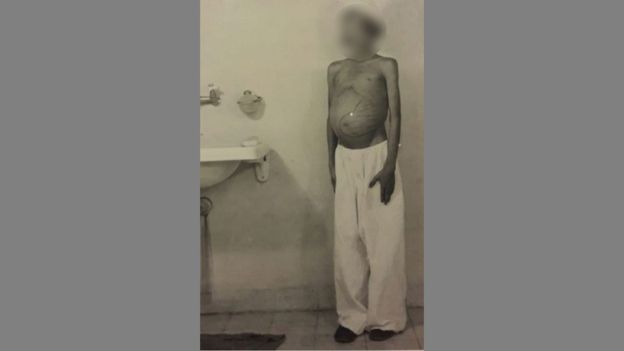 |
| KNESSET SPECIAL COMMITTEE – Disturbing photographs of malnourished children in hospital with the word “spleen” marked on their body were shown in evidence to the Knesset special committee |
Media caption ‘I
want to know where my daughter went’
want to know where my daughter went’
“It
started to bother me. Something was not right. I couldn’t sleep at night. I
decided I had to know what happened,” Leah says.
started to bother me. Something was not right. I couldn’t sleep at night. I
decided I had to know what happened,” Leah says.
Leah had experienced many calamities long before
the loss of her baby. As a child, she and her family had joined thousands of
Jews fleeing violence in Yemen. They were robbed as they trekked from one end
of the country to the other and Leah was reduced to begging for food. Then they
were rescued in an airlift known as Operation Magic Carpet.
the loss of her baby. As a child, she and her family had joined thousands of
Jews fleeing violence in Yemen. They were robbed as they trekked from one end
of the country to the other and Leah was reduced to begging for food. Then they
were rescued in an airlift known as Operation Magic Carpet.
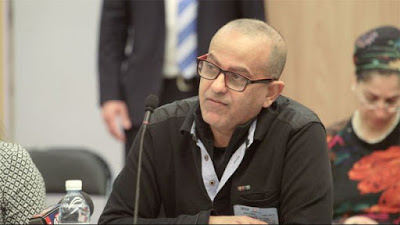 |
| Rafi Shubeli, Yemenite-Israeli historian and activist from the group Our Brothers Exist, giving evidence in the Knesset |
“It was
the land I had always dreamed about,” the 78-year-old recalls, remembering the flight to
Israel.
the land I had always dreamed about,” the 78-year-old recalls, remembering the flight to
Israel.
“When
we got off the plane everyone kissed the holy ground.
we got off the plane everyone kissed the holy ground.
“Then
we heard the bombs and grenades and saw the smoke.”
we heard the bombs and grenades and saw the smoke.”
They had arrived, malnourished and penniless,
during the first Arab-Israeli war.
during the first Arab-Israeli war.
Many Yemenite Jews spent periods in transit camps
before being settled in homes, and stories of babies going missing began to
arise immediately.
before being settled in homes, and stories of babies going missing began to
arise immediately.
Some reports talk of children disappearing after
visits to the camps by wealthy American Jews.
visits to the camps by wealthy American Jews.
In other cases children appeared to be recovering
in hospitals from relatively minor ailments when the parents were suddenly told
they had died.
in hospitals from relatively minor ailments when the parents were suddenly told
they had died.
On kibbutzes, where some of the Yemenites settled,
it was typical for youngsters to be separated from their parents and looked
after together, and here too it’s said that some children vanished.
it was typical for youngsters to be separated from their parents and looked
after together, and here too it’s said that some children vanished.
Image copyright Spielberg Jewish Film Archive Image
caption Children were routinely separated from their parents on kibbutzes
caption Children were routinely separated from their parents on kibbutzes
Estimates of the number of missing children range
from hundreds to thousands.
from hundreds to thousands.
In many cases the parents believe their children were
really kidnapped and given or sold to families of European Jews – occasionally
Holocaust survivors who had lost their children – or Americans.
really kidnapped and given or sold to families of European Jews – occasionally
Holocaust survivors who had lost their children – or Americans.
Over time, Leah, like many other parents, ceased to
believe in the story of her child’s death.
believe in the story of her child’s death.
“I went
to my father and told him, but he said I should never suspect another Jew stole
my child,” she says.
to my father and told him, but he said I should never suspect another Jew stole
my child,” she says.
She went in search of documents that would reveal
the truth about what happened to Hanna, and was deeply disturbed by what she
found.
the truth about what happened to Hanna, and was deeply disturbed by what she
found.
One document she obtained said the babies were
moved to Tel Aviv after the date on Hanna’s death certificate.
moved to Tel Aviv after the date on Hanna’s death certificate.
Another was a second death certificate, dated three
years later than the first – long after Leah and her husband had been told
their daughter had died.
years later than the first – long after Leah and her husband had been told
their daughter had died.
Like Leah, most parents received no information
about their child’s grave. When they did, in some cases it transpired that the
grave was empty, or DNA tests showed that the body was not theirs.
about their child’s grave. When they did, in some cases it transpired that the
grave was empty, or DNA tests showed that the body was not theirs.
Three government inquiries have looked into the
Yemenite Children Affair, as it is known, since the 1960s, and all have
concluded that most children died of diseases and were buried without their
parents being informed or involved.
Yemenite Children Affair, as it is known, since the 1960s, and all have
concluded that most children died of diseases and were buried without their
parents being informed or involved.
But many of the families involved suspect a
cover-up and continue to believe that there was an organised operation to
snatch children, involving health workers and government officials.
cover-up and continue to believe that there was an organised operation to
snatch children, involving health workers and government officials.
So last year the government of Benjamin Netanyahu
decided to open up most of the archives of the public inquiries and put them online.
decided to open up most of the archives of the public inquiries and put them online.
Netanyahu said this marked a new era of
transparency and would “right an
historic wrong“.
transparency and would “right an
historic wrong“.
Last week it led to shocking revelations in a Knesset
committee about medical experiments on Yemenite children. Testimony given under
oath at one of the earlier inquiries revealed that four undernourished babies
died after being given an experimental protein injection, and that many
children died as a result of medical negligence.
committee about medical experiments on Yemenite children. Testimony given under
oath at one of the earlier inquiries revealed that four undernourished babies
died after being given an experimental protein injection, and that many
children died as a result of medical negligence.
Image copyright Knesset Special Committee Image
caption Disturbing photographs of malnourished children in hospital with the
word “spleen” marked on their body were shown in evidence to the
Knesset special committee
caption Disturbing photographs of malnourished children in hospital with the
word “spleen” marked on their body were shown in evidence to the
Knesset special committee
Post-mortem examinations were carried out on
children, who were then buried in mass graves in violation of Jewish tradition,
the special Knesset committee on the disappearance of children heard. In some
cases the children’s hearts were removed for US doctors, who were studying why
there was almost no heart disease in Yemen.
children, who were then buried in mass graves in violation of Jewish tradition,
the special Knesset committee on the disappearance of children heard. In some
cases the children’s hearts were removed for US doctors, who were studying why
there was almost no heart disease in Yemen.
“It’s a
big scandal that the doctors didn’t tell the parents they were doing
experiments and research on their children,” says Nurit
Koren, the chair of the committee.
big scandal that the doctors didn’t tell the parents they were doing
experiments and research on their children,” says Nurit
Koren, the chair of the committee.
“And even worse there are healthy
babies who died from an experimental treatment. It’s a crime, it was on
purpose, and it let to their death.”
babies who died from an experimental treatment. It’s a crime, it was on
purpose, and it let to their death.”
Koren is herself the child of parents from Yemen.
One of her cousins and her mother-in-law’s sister were among the children who
disappeared. So one of her objectives, on being elected, was to reopen the
subject, which she describes as “an
open wound in the heart of the Israeli nation”.
One of her cousins and her mother-in-law’s sister were among the children who
disappeared. So one of her objectives, on being elected, was to reopen the
subject, which she describes as “an
open wound in the heart of the Israeli nation”.
One of the disturbing aspects of the Yemenite
Children Affair is the way the darker-skinned immigrants appear to have been
treated as second-class citizens. The founders of Israel were mostly Ashkenazi
Jews, of European descent, some of whom expressed fears that Mizrahi (literally
“Eastern”) Jews brought with them a backwards “Oriental”
culture that might damage the new state.
Children Affair is the way the darker-skinned immigrants appear to have been
treated as second-class citizens. The founders of Israel were mostly Ashkenazi
Jews, of European descent, some of whom expressed fears that Mizrahi (literally
“Eastern”) Jews brought with them a backwards “Oriental”
culture that might damage the new state.
“Zionism
– what is it really about?” asks Rafi Shubeli, a Yemenite-Israeli historian
and activist from the group Our Brothers Do Exist.
– what is it really about?” asks Rafi Shubeli, a Yemenite-Israeli historian
and activist from the group Our Brothers Do Exist.
“What were its intentions towards
Mediterranean Jews, the Jews of the Islamic world?
Mediterranean Jews, the Jews of the Islamic world?
“There
are very many elements in Israeli society who want to avoid this kind of
discussion.”
are very many elements in Israeli society who want to avoid this kind of
discussion.”
Whether there was an organised conspiracy to snatch
Yemenite babies and give them away for adoption remains unproven though,
according to historian Tom Segev, who has written books on Israel’s early years
and served as an expert witness for one government inquiry.
Yemenite babies and give them away for adoption remains unproven though,
according to historian Tom Segev, who has written books on Israel’s early years
and served as an expert witness for one government inquiry.
He points out that hundreds of thousands of
immigrants arrived in Israel at a time of war, and in the years immediately
afterwards, when the country was still reeling.
immigrants arrived in Israel at a time of war, and in the years immediately
afterwards, when the country was still reeling.
“All
these people came in very, very difficult conditions and it’s a story of
chaos,” Segev says.
these people came in very, very difficult conditions and it’s a story of
chaos,” Segev says.
Media captionTom Segev: “I don’t think there was a conspiracy”
Yemenites were housed in tents and had to endure
heavy winters. There were child mortality rates of 50%, he points out.
heavy winters. There were child mortality rates of 50%, he points out.
Some children may have been given away, he accepts.
“In
some cases this might have happened: one, two, three, four, 10 – I don’t know
how many,” he says.
some cases this might have happened: one, two, three, four, 10 – I don’t know
how many,” he says.
But in most cases the children just died, he
believes.
believes.
“It’s
probably the most tragic story of the return of Jews to Israel.”
probably the most tragic story of the return of Jews to Israel.”
Working with Nurit Koren, MyHeritage, a company
that researches family ancestry, recently began offering help to Yemenite Jews
who have a missing child, or who think they were secretly adopted.
that researches family ancestry, recently began offering help to Yemenite Jews
who have a missing child, or who think they were secretly adopted.
Leah Aharoni, who has long been convinced that her
daughter, Hanna, could be alive and searching for her biological family, gave a
DNA sample – samples of cells from the inside of her cheek – to be checked
against others in a new database for Yemenite-Israelis.
daughter, Hanna, could be alive and searching for her biological family, gave a
DNA sample – samples of cells from the inside of her cheek – to be checked
against others in a new database for Yemenite-Israelis.
“I want
to find out where my daughter went. I want her to know that I didn’t abandon
her, that I love her,” Leah says. “I was tricked.”
to find out where my daughter went. I want her to know that I didn’t abandon
her, that I love her,” Leah says. “I was tricked.”
She is encouraged by a few cases in which adults in
Israel and abroad found out they had been adopted, and managed to trace their
Yemenite parents. She is still waiting to find out if there is a match for her.
Israel and abroad found out they had been adopted, and managed to trace their
Yemenite parents. She is still waiting to find out if there is a match for her.
At a beachside cafe in Haifa, I meet a physicist
who is philosophical about how his life was shaped by this time of turmoil.
who is philosophical about how his life was shaped by this time of turmoil.
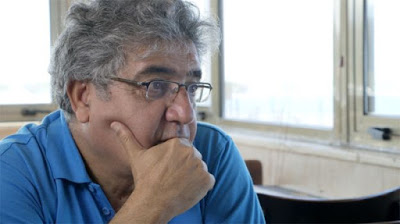 |
| Image caption Yehuda Kantor found his biological family through DNA testing |
A few months ago, Yehuda Kantor became the first
person to be reunited with his biological family through the MyHeritage testing
programme.
He had spent more than 20 years searching for his
biological mother – making regular appearances in the media to publicise his
case.
biological mother – making regular appearances in the media to publicise his
case.
“I got
hundreds of telephone numbers and lots of information but none quite fitted my
story. I tried some DNA tests but it was in vain,” Yehuda
says.
hundreds of telephone numbers and lots of information but none quite fitted my
story. I tried some DNA tests but it was in vain,” Yehuda
says.
Yehuda had a happy childhood, raised in nearby
Afula by Batia and Asher Kantor, an Ashkenazi Jewish couple originally from
Eastern Europe.
Afula by Batia and Asher Kantor, an Ashkenazi Jewish couple originally from
Eastern Europe.
Image caption Yehuda as a child with his adoptive
family
family
Photographs show he had a darker complexion than
his relatives and school friends.
his relatives and school friends.
However, it was not until he reached his twenties
that he discovered what much of his close-knit community already knew: he was
adopted.
that he discovered what much of his close-knit community already knew: he was
adopted.
His mother, who had been unable to conceive,
revealed she had brought him home from a small orphanage, aged three.
revealed she had brought him home from a small orphanage, aged three.
She always feared losing him and so, out of respect
for his adoptive parents, it was only after they died that Yehuda opened his
adoption file.
for his adoptive parents, it was only after they died that Yehuda opened his
adoption file.
This showed no signature of consent from his
Yemenite biological mother and gave only her first name, Zahara.
Yemenite biological mother and gave only her first name, Zahara.
MyHeritage was able to use that to trace a grave
for a woman who had died 17 years ago.
for a woman who had died 17 years ago.
They then approached her five children asking them
to do DNA tests. These showed they are the half-brother and half-sisters of
Yehuda.
to do DNA tests. These showed they are the half-brother and half-sisters of
Yehuda.
“Wow,
there are a lot,” remarked Yehuda, as he was told the news ahead of
an emotional first meeting filmed by Israeli television.
there are a lot,” remarked Yehuda, as he was told the news ahead of
an emotional first meeting filmed by Israeli television.
His biological siblings had never been told of the
existence of an older brother and were unable to explain the circumstances of
his adoption.
existence of an older brother and were unable to explain the circumstances of
his adoption.
However, they were able to give some information on
his roots and Yehuda is delighted to be getting to know them better.
his roots and Yehuda is delighted to be getting to know them better.
“I’m
happy the circle was completed and I now know the history, the origin and I
know which family [I’m from] from a genetic point of view,” he says.
happy the circle was completed and I now know the history, the origin and I
know which family [I’m from] from a genetic point of view,” he says.
“You
cannot regret what happened in the past. This is my life. I accept it as it
is.”
cannot regret what happened in the past. This is my life. I accept it as it
is.”
Additional reporting by Erica Chernofsky
Posted in Blog

